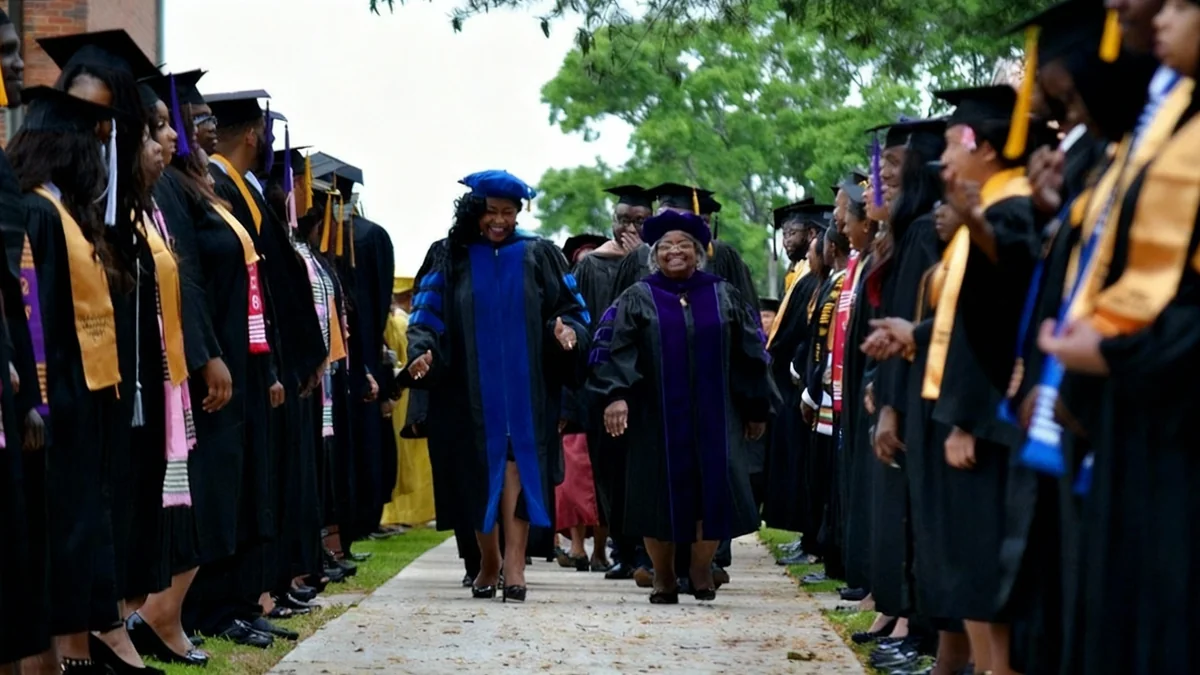A new study reveals a significant financial outcome for higher education in Alabama. According to data from the Strada Education Foundation, approximately 67% of college students in the state earn enough money within ten years of graduation to offset the entire cost of their degree.
This finding provides a data-driven perspective on the value of a college education in Alabama, suggesting that for a majority of graduates, the investment yields a positive financial return in the first decade of their careers.
Key Takeaways
- A study by the Strada Education Foundation analyzed the return on investment for college degrees in Alabama.
- About 67%, or two-thirds, of Alabama college students see a positive financial return within 10 years of graduating.
- A positive return means graduates have earned more than the net cost of their education, including tuition and fees minus financial aid.
- The data underscores the ongoing debate about the financial viability and long-term benefits of pursuing higher education.
Defining Return on Investment in Education
The concept of return on investment (ROI) is commonly used in business to measure the profitability of an expenditure. When applied to education, it calculates whether the increased earnings a graduate receives are greater than the total cost of their degree over a specific period.
In the context of the Strada Education Foundation study, a positive ROI is achieved when a graduate's earnings, above what they likely would have made with only a high school diploma, surpass the net price they paid for their college education. The study's timeframe for this measurement is the first 10 years after graduation.
This 10-year window is a critical period, as it often coincides with early career growth, when salaries begin to increase and individuals start making significant financial decisions, such as buying a home or starting a family.
How is Net Price Calculated?
The net price of a college degree is not the same as the sticker price. It is calculated by taking the total cost of attendance (tuition, fees, room, and board) and subtracting any grants and scholarships the student receives. This figure represents the actual amount a student and their family must pay out-of-pocket or through loans.
A Closer Look at the Alabama Data
The finding that 67% of Alabama students recoup their educational costs within a decade is a significant statistic for the state. It suggests that for two out of every three graduates, the financial gamble of attending college pays off relatively quickly.
This figure positions Alabama within the broader national conversation about college affordability and outcomes. While a degree has long been seen as a pathway to higher lifetime earnings, rising tuition costs and student loan debt have led many to question the immediate financial benefits.
The Strada study provides a concrete metric, indicating that a substantial majority of graduates in the state are, in fact, realizing a tangible financial benefit that justifies their initial investment in higher education.
National Student Debt Perspective
According to recent federal data, the average student loan debt for a bachelor's degree recipient in the United States is nearly $30,000. This debt level is a major factor in how long it takes for a graduate to achieve a positive return on their educational investment.
Factors That Influence College ROI
The return on investment from a college degree is not uniform and can be influenced by several key factors. Understanding these variables can help prospective students make more informed decisions.
Choice of Major and Field of Study
One of the most significant determinants of ROI is a student's major. Fields such as engineering, computer science, nursing, and business typically lead to higher starting salaries and faster wage growth. Graduates in these high-demand fields often see a positive ROI much sooner than 10 years.
Conversely, majors in the liberal arts, humanities, and social sciences may have lower initial starting salaries, potentially extending the time it takes to recoup the cost of the degree. However, these fields often develop critical thinking and communication skills that can lead to significant career growth over a longer period.
Type of Institution
The kind of institution a student attends also plays a crucial role. There are several considerations:
- Public vs. Private: In-state public universities generally have lower tuition costs than private institutions, which can lead to a quicker ROI. However, some private colleges offer substantial financial aid packages that can lower the net price significantly.
- Two-Year vs. Four-Year: Starting at a community college and then transferring to a four-year university can dramatically reduce the overall cost of a bachelor's degree, thereby improving the ROI.
- Institutional Reputation: Attending a highly-regarded program or university can sometimes open doors to higher-paying jobs, which can offset a higher initial cost.
Implications for Alabama Students and Policymakers
The results of this study have important implications for both individuals and the state. For students and their families, this data can serve as a reassuring indicator that a college education in Alabama is a worthwhile financial endeavor for most.
"Understanding the financial outcomes associated with different educational pathways is crucial for making informed decisions," noted a higher education analyst. "Data like this helps demystify the value proposition of a college degree."
For state policymakers and university administrators, the 67% figure is a positive benchmark. However, it also highlights that one-third of students are not seeing a return within the first decade. This could prompt further investigation into programs or institutions with lower outcomes and encourage initiatives aimed at improving affordability and post-graduation employment rates.
Efforts to strengthen ties between universities and local industries, enhance career services, and control tuition costs are all strategies that could help increase the percentage of graduates who achieve a positive ROI, ensuring that a college degree remains a powerful tool for economic mobility in Alabama.





